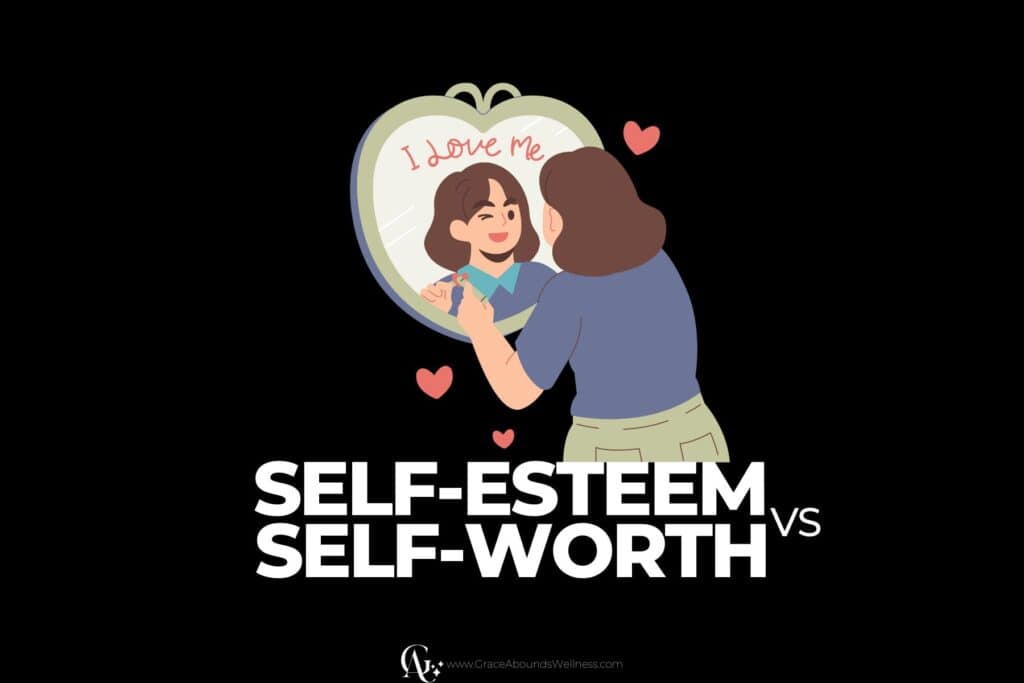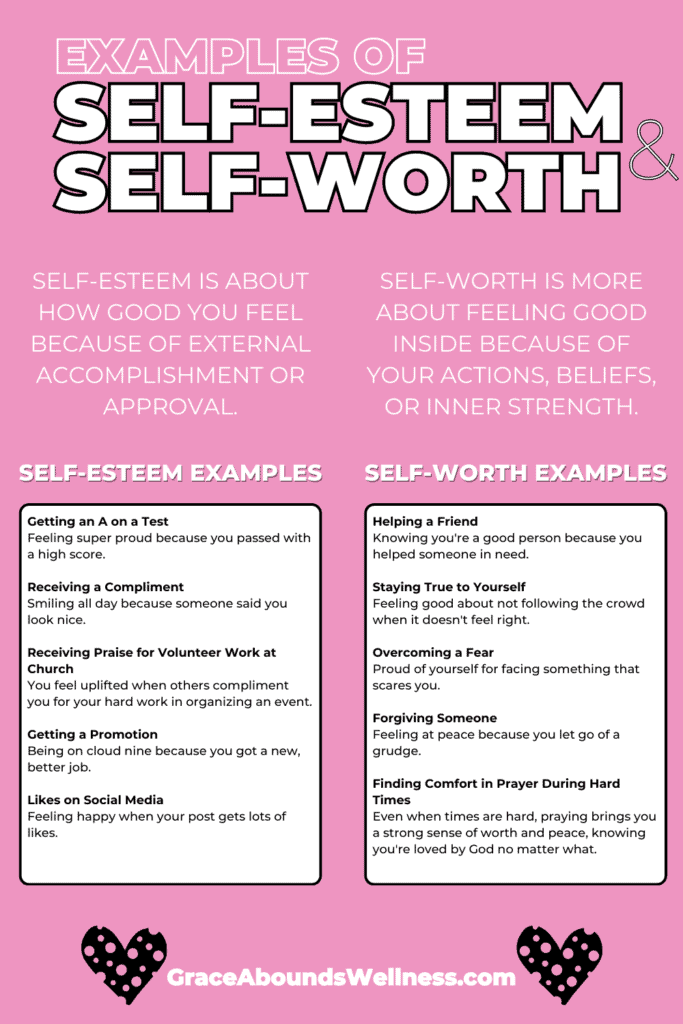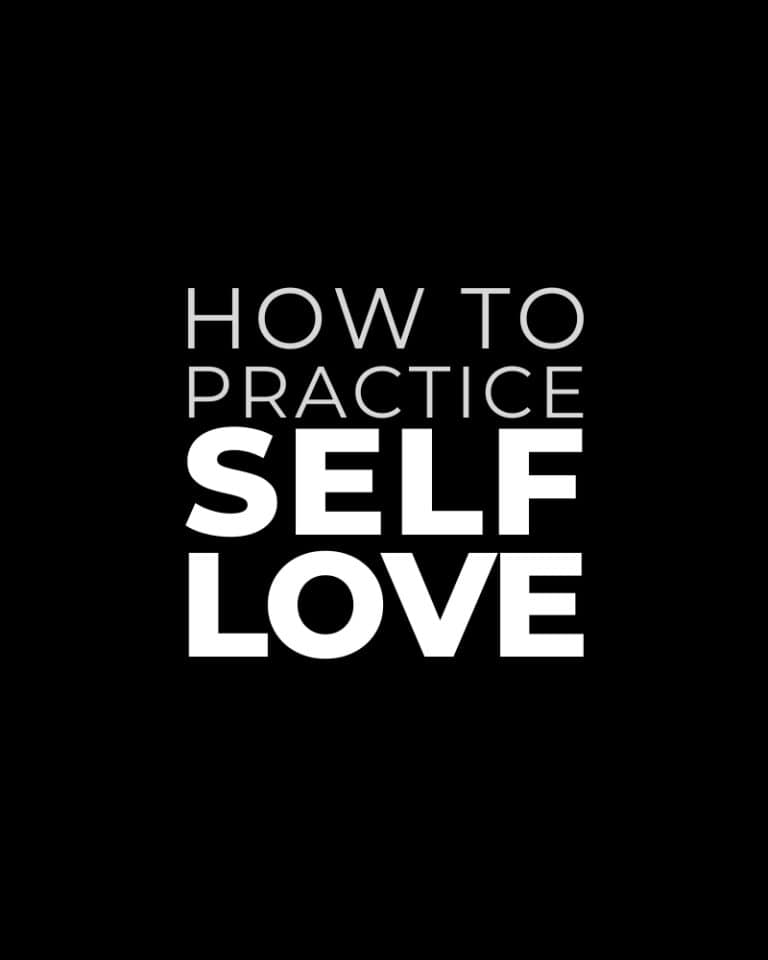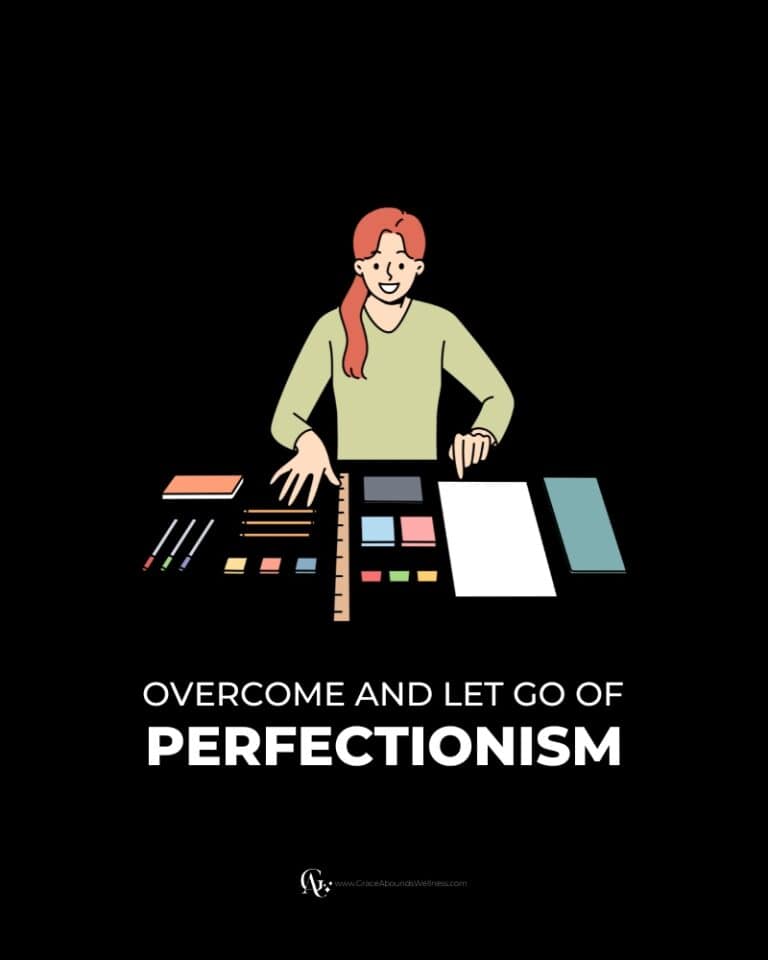Self-Esteem vs Self-Worth: Why It’s Important…
This post is all about exploring self-esteem vs self-worth, why self-worth is important for Christian women struggling with body image issues, and how to build self-worth.
Heads up! This post may contain affiliate links, which means I get a small commission if you make a purchase — at no extra cost to you. I only recommend products I love and trust! Read my full disclosure here.

Have you ever noticed how your resident critic (a.k.a. you) amplifies negative thoughts when you’re struggling with low self-worth?
It’s like…
You’re caught in a tug-of-war between feeling confident and actually feeling loved.
This emotional rollercoaster gets worse because of things like societal norms and social media, making you insecure about how much you really matter — your true value.
Sometimes, we get mixed up between self-worth and self-esteem.
And that’s actually pretty common. Experts, like those at the American Psychological Association, say it’s super important to know the difference for your own mental health.
You might feel confident because people praise you or because you’re doing well, but this doesn’t always mean you truly value yourself deep down.
Sometimes — even when you seem confident on the outside — you can still have a low internal sense of self-worth. This can lead to a lot of negative feelings and a never-ending feeling of inadequacy.
In this post, we dive into self-esteem vs self-worth, examples of self-worth, and how to build self-worth. Discover self-compassion exercises and positive self-talk to shake off chronic low self-esteem. You’ll learn why nurturing self-worth, deeply rooted in God’s love, is key to your emotional well-being and personal growth.
Self-Esteem vs Self-Worth
What’s the difference between self-esteem and self-worth?
Let’s dive into what each really means and why the distinction matters so much.
Have you ever confused the two?
Well, let’s clarify them together because understanding the difference between self-esteem and self-worth is a game-changer for you!
Here are the definitions of self-worth and self-esteem…
Self-esteem is how you feel about yourself based on external factors, like compliments or achievements. It’s like a mirror reflecting society’s view of you.
On the other hand…
Self-worth is about feeling worthy of love, regardless of these external things. It’s your internal sense of value, coming from your core beliefs and inner dialogue.
Society often mixes these up, making you think they’re the same.
But here’s the key difference…
Healthy self-esteem is great — but it’s just one layer of self-care. True, lasting confidence comes from healthy self-worth.
This means knowing your inherent value isn’t tied to what you look like or what others think…
Now that we’ve done the self-esteem vs self-worth comparison, let’s see why self-worth specifically plays such a crucial role.
Think about moments in your life when self-worth was challenged.
How did it feel?
Why Self-Worth Is Important
Why is this essential?
Because understanding the importance of self-worth is one thing — but recognizing what shapes our self-worth is another and can be life-changing!
When you have low self-worth, it often leads to feelings of inadequacy and a sense of disconnection from God’s view of you.
This can affect your daily life and faith — making you feel like you’re not living up to your potential.
But here’s the hope…
Recent research shows that a healthy sense of self-worth leads to a positive outlook on life and a higher level of self-acceptance.
So, let’s break it down…
Self-esteem might help you face new things with confidence, but self-worth ensures you don’t crumble when external praise isn’t there…
It’s about feeling good from the inside out, and it plays an important role in your Christian walk too.
Nurturing self-worth, rooted in God’s love, means embracing your true — inherent value as a daughter of God.
It’s about aligning yourself with God’s perspective of who you are.
When you see yourself as God sees you – inherently valuable and loved – your life quality improves…
You start to live more confidently, joyfully, and in harmony with God’s gift of grace.
You align your thoughts, actions, and sense of worth with how God sees you.
When your self-worth aligns with these beliefs, it positively influences how you…
- interact with the world
- cope with new challenges
- make decisions
- and treat yourself and others.
Essentially, you integrate your belief in your inherent value as a beautiful and unique image bearer into every aspect of your life.
Take a moment to reflect on the factors in your life that have influenced your sense of worth.
Are they mostly internal or external?
Overcome Your Body Image Struggles…
Download your FREE 18-page “Body Image Redefined Fast Track” so you can begin your life-transforming journey toward self-acceptance and embrace your identity as a cherished daughter of God TODAY!

What Determines Self-Worth
A variety of factors influence self-worth, and understanding these can help strengthen it from a stable, internal foundation.
Here’s a breakdown…
External Factors that Influence Self-Worth
- Social Media & Societal Pressures: These can make you feel bad about yourself.
- Physical Appearance: Society often makes too big a deal about appearance.
- Feedback from Others: Positive reinforcement or criticism from family, friends, or colleagues can change how you see yourself.
Internal Factors that Influence Self-Worth
- Inner Critic: The way you talk to yourself can make you feel really good or really bad about who you are.
- Personality Traits: Some parts of your personality can change how you value yourself.
- Early Childhood Experiences: What happened when you were younger plays a big part in how you see yourself now.
- Mental Health: If you struggle with things like depression or anxiety, it can affect how much you value yourself.
Relying on external factors for self-worth is kinda unstable….
Because societal norms and others’ opinions are inconsistent and can lead to negative emotions and low self-confidence…
And the pressure to maintain a certain image can be exhausting and unsustainable.
So, by shifting the focus from external validations to internal, more stable factors — you can build a strong foundation for self-worth.
This change can lead to a healthier sense of self-esteem, better relationships, and overall peace of mind.
Now, with a clearer picture of what influences self-worth…
Let’s look at some real-life examples to bring these concepts to life.
💖 Explore Related Posts 💖
- How To Build Self-Worth God’s Way: 12 Simple Steps
- 5 Ways to Deepen Your Relationship with God
- 101 Body Image Affirmations for Christian Women
Self-Esteem vs Self-Worth Examples
Self-esteem is about how good you feel because of external accomplishment or approval.
As you read these examples, think about how they might mirror situations in your own life…
Self-Esteem Examples
- Getting an A on a Test: Feeling super proud because you passed with a high score.
- Receiving a Compliment: Smiling all day because someone said you look nice.
- Receiving Praise for Volunteer Work at Church: You feel uplifted when others compliment you for your hard work in organizing an event.
- Getting a Promotion: Being on cloud nine because you got a new, better job.
- Likes on Social Media: Feeling happy when your post gets lots of likes.
Self-worth is more about feeling good inside because of your actions, beliefs, or inner strength.
Self-Worth Examples
- Helping a Friend: Knowing you’re a good person because you helped someone in need.
- Staying True to Yourself: Feeling good about not following the crowd when it doesn’t feel right.
- Overcoming a Fear: Proud of yourself for facing something that scares you.
- Forgiving Someone: Feeling at peace because you let go of a grudge.
- Finding Comfort in Prayer During Hard Times: Even when times are hard, praying brings you a strong sense of worth and peace, knowing you’re loved by God no matter what.

How You Can Recognize Your Own Self-Worth
You can find this inner peace too…
- It starts when you understand that your true value doesn’t come from what you own or what others think of you.
- It’s about how you see yourself based on who God says you are and what you believe is important.
Think about times when you were proud of yourself, not because others praised you, but because you felt good about what you did. That feeling is what real self-worth is all about!
Self-Esteem vs Self-Worth Through Romans 12:3
I believe this verse answers the question:
Can you have high self-esteem but low self-worth?
Romans 12:3 teaches us about humility and self-awareness…
“For by the grace given me I say to every one of you: Do not think of yourself more highly than you ought, but rather think of yourself with sober judgment, in accordance with the faith God has distributed to each of you.”
This verse tells us you can…
- feel confident
- have high self-esteem
- and look successful to others
- but still struggle with self-worth.
Real self-worth isn’t about what you achieve or what others think of you…
It’s about knowing and accepting that you’re valuable because you are a creation of God.
Seeing these examples might make you wonder how you can cultivate your own self-worth, especially through the lens of grace…
Take a look at the following steps and write down which step(s) resonates most with you.
And ask yourself if there’s one you’re excited to try.
How to Build Self-Worth
Click here to check out my post on How to Build Self-Worth God’s Way.
Building self-worth in a way that aligns with Christian values can be a life-changing journey.
Here’s a brief overview of the 12 steps to help you on this path:
- Embrace Your Identity in Christ: Recognize your unique worth as God’s creation.
- Daily Bible Reading: Deepen your understanding of your worth through the teachings of God’s word.
- Daily Prayer: Make it a habit to have regular conversations with God and seek His guidance.
- Positive Affirmations: Start each day with Bible verses that affirm your worth.
- Serve Others: To build your self-confidence, you can help others and reflect on the value that you bring through these acts.
- Replace Negative Thoughts with God’s Words: Counter self-doubt with Biblical truths.
- Practice Forgiveness: Write forgiveness letters to heal and understand your worth.
- Get Support: Engage with your church community to discuss and grow in your understanding of self-worth.
- Journal: End your day by noting things you’re grateful for and reflect on God’s love.
- Create a Vision Board: Visualize your identity and God’s plan for you.
- Trust in God’s Plan: Find confidence in God’s path for your life.
- Share Your Journey: Discuss your experiences and growth with someone you trust.
These steps are designed to guide you toward seeing yourself through God’s loving lens.
Adopt these practices to nurture your spiritual and emotional growth and to build self-worth that is deeply rooted in God’s grace.
💖 Recommended Resources 💖
Check out all of the FREE Body Image Related Resources here!
Self-Esteem vs Self-Worth FAQ’S
You might still have some questions about self-esteem and self-worth.
So let’s address a few common ones…
Is self-esteem a sense of self-worth?
No, they’re similar but not the same.
Self-esteem is more about how you feel because of things like compliments or success. It’s about confidence.
Self-worth goes deeper. It’s about knowing you’re valuable just because of Whose you are, not because of what you do or what others say. It’s a sense of your own value as a daughter of a loving Father.
Can you have high self-esteem but low self-worth?
Yes, you can.
It’s possible to seem confident and successful to others (high self-esteem) but still not feel truly good about yourself inside (low self-worth).
Like, you might do well at school or work but still not feel like you’re enough.
True self-worth is about feeling valued and loved for who you are, not just for what you achieve or how others see you.
What are some examples of low self-esteem in the Bible?
In the Bible, characters like Moses and Gideon showed signs of low self-esteem at times…
- Moses doubted his ability to lead the Israelites, feeling that he was not good enough or skilled enough to speak to Pharaoh.
- Gideon also doubted his strength and importance when called by God.
But both of their stories show that with faith and trust in God, they overcame their doubts.
This is a reminder that your value doesn’t come from your own perception but from God’s belief in you.
If there were one thing I’d want you to walk away with today, it’s this…
Understanding the difference between self-esteem vs self-worth is key for your emotional and spiritual journey.
Remember, true self-worth comes from within and knowing you’re valued by God.
NEXT STEPS: HERE’S WHAT YOU CAN DO TODAY
Start with one small step…
Pick a Bible verse that speaks to your worth and remind yourself of it throughout the day.
This simple act can start shifting how you see yourself.
Here are a few Bible verses that speak to self-worth to get you started…
- Isaiah 41:10 – Reminds us that God is always with us, giving us strength and support.
- Joshua 1:5 – God’s promise of His constant presence and support.
- Jeremiah 17:7 – Blessings for those who trust in the Lord.
- 2 Corinthians 10:12 – Encourages not comparing ourselves with others.
- Psalm 27:3 – Confidence in the face of adversity through faith.
- Luke 12:7 – Affirmation of our value to God.
- Psalm 139:13–14 – Celebrating how wonderfully we are made.
- 1 Corinthians 6:20 – Recognizing our worth to God.
- Isaiah 40:31 – Finding strength and renewal in the Lord.
- Hebrews 10:35–36 – Encouragement to maintain confidence in God’s promises.
This post was all about self-esteem vs self-worth, I hope you enjoyed it and that it helps you overcome low self-esteem and low self-worth. So you can live a life filled with joy and be the bold — confident woman God intended you to be!
My prayer for you is that my decades of experience of — an all-consuming battle with the scale — self-worth struggles — and how God has radically worked on my heart will bless and inspire you!
You’re Invited…
You have an open invitation to binge on all of my posts — written with Holy Spirit-inspired words and filled with love just for you — my beautiful friend.
If you love this content and want to be the first to know of the best in grace-first wellness, scroll to the bottom and subscribe to The Grace Abounds Collective newsletter.
Sharing is caring! Share this post with someone who needs the life-transforming grace and love of Jesus. It’s super easy! Just tap any of the share buttons — to the left on your screen.
Thank you for joining me on this journey. You are loved, precious, and wonderfully made.







Join the List
Stay up to date & receive the latest posts in your inbox.